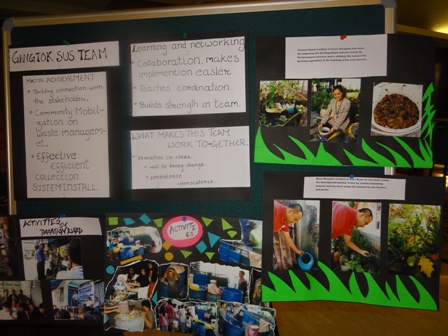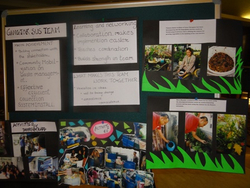Detailed action plans come out of interactive SUS international workshop

It was four days of intense talking and sharing for the cities and organizations partners of the Supporting Urban Sustainability (SUS) 2nd international workshop, which was organized by CEE, ICLEI South Asia and SWEDESD on 25-28th September in Delhi. The SUS programme, of which ICLEI South Asia is a partner, brings together stakeholders from different cities to engage in collaborative learning on urban development. Representatives from the project cities of Gangtok, Guwahati, Guntur, Malvan, Kozhikode (India), Rajshahi (Bangladesh), and Thimphu (Bhutan) thus gathered in Delhi to review what had been achieved since the beginning of the year and to plan for the future.
Each city in the SUS programme has chosen an issue (‘inquiry’) that will be pursued during the project, covering several areas of sustainable urban development, from poverty alleviation, to river buffer zone development, to ground water protection, to solid waste management improvement, enhancement of traditional livelihoods and wetlands protection. As Mr Sobhindran from Kozhikode very inspiringly said, “The two worlds are in conflict, the world created by God and the one created by man. This is an attempt to resolve it!”
One of the main focus of the workshop, as of the programme itself, was also helping project cities realize the importance of discussion and consultation. The participating cities thus reported on the several activities they have been working on to advance their inquiry, ranging from balancing gender issues, organizing clean-up sessions or zero waste orientation, energy generation through waste, e-waste management, managing fisheries and tourism, enabling cycling to reduce pollution, rain water harvesting, protecting and conserving water bodies preserving fishermen rights, re-sectioning of the river area or composting. This was however done in an interactive way, by partnering cities with one another, for them to discuss in depth the inquiry and give comments and suggestions to those of the partners
Importance was also given to expanding the understanding of the participants regarding urban systems and ecosystems, ecosystem services, and their interconnections. The cities were encouraged to link their inquiries to different urban systems and ecosystems and identify the interconnections them. At the end of the day, the cities conducted a power analysis of the stakeholders in their teams to identify their different strengths and weaknesses. Both these exercises fed into the action plan that was prepared by the stakeholder teams of the cities on the last day. These action plans were reviewed by partner cities in detail and then presented to the entire group to declare the commitments of each city to the inquiry.
The field visit, part of the 4-day workshop, gave participants the chance to witness first-hand the rain water harvesting system and decentralized waste water management system established by the Centre for Science and Environment, where they were explained the simple science and technology behind these very effective means of natural resource protection. The participants also visited the Yamuna Biodiversity Park, which is a heritage site and repository for about 30 threatened communities of the River Yamuna basin. The Park provides also ecological services like local climate amelioration, carbon sequestration, ground water recharge, protection of wild gene pools and is a living example of how nature works to maintain biodiversity.
The interactive and consultation-based format of the workshop led to an impressive range of comments, suggestions and ideas that cities shared to solve each other’s challenges and fulfill their ambitions. Project cities and partners left not only with a detailed action plan, but also with a lot of inspiration and enthusiasm to continue the work under the SUS programme and beyond.
